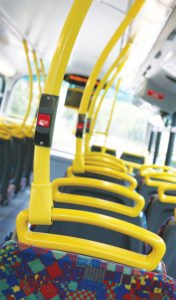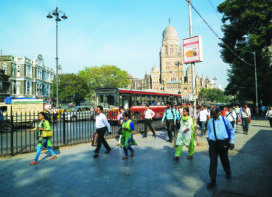
The mobility sector in India is undergoing a digital transformation. And there are opportunities to foster public-private collaboration for better bus systems in India says Shilpa Kharwal, Consultant, Cities and Transport, WRI India
 Public bus agencies, referred to as State Road Transpor t Undertakings (SRTUs), are investing millions in setting up Intelligent Transport Systems to improve the efficiency of bus systems. At the same time, mobility entrepreneurs backed by heavy investments, are developing innovative technologies and services to address prevailing mobility issues.
Public bus agencies, referred to as State Road Transpor t Undertakings (SRTUs), are investing millions in setting up Intelligent Transport Systems to improve the efficiency of bus systems. At the same time, mobility entrepreneurs backed by heavy investments, are developing innovative technologies and services to address prevailing mobility issues.
This evolving ecosystem provides a great opportunity for public bus agencies and private enterprises to come together and co-create solutions aimed at augmenting the quality and services of bus systems in our cities. Public agencies can adopt innovative technologies and service models offered by private enterprises, who in return can generate stable revenue streams to support their long-term growth. However, there are several obstacles that impact the success of such collaborations.
A key regulatory challenge is the process of tendering that is followed by public agencies to procure goods and services from the private sector. It requires all bidders to meet eligibility criteria such as minimum company turnovers, minimum experience and submission of security deposits. Young enterprises with innovative technology and service models that want to work with the Government struggle to meet these stringent requirements and are unable to participate in the bidding process. The entire process deprives young enterprises a level playing field as compared to established industry players, who can easily meet the tender requirements. Although the Central Government has relaxed the provisions for submission of prior turnover and experience documents for new enterprises, their inclusion in the bidding processes has been extremely slow and limited. Additionally, the lack of a ‘single window’, makes establishing connections with public agencies a tedious and time-consuming process for private enterprises.
 Public agencies are also sceptical about the ability of young enterprises to execute large scale and investment-heavy government projects. Then again, governments willing to work with new enterprises find it challenging to reach out to private enterprises due to a lack of awareness about their solutions, distant geographical locations and limited networking capacities. Financially constrained transit agencies are unable to dedicate technical and financial resources for identifying, leveraging and testing the new solutions. The situation is aggravated further due to institutional challenges such as the absence of a unified transport authority that is empowered to take all decisions on mobility in the city. This inhibits the development of an ecosystem where transit innovation can be holistically nurtured.
Public agencies are also sceptical about the ability of young enterprises to execute large scale and investment-heavy government projects. Then again, governments willing to work with new enterprises find it challenging to reach out to private enterprises due to a lack of awareness about their solutions, distant geographical locations and limited networking capacities. Financially constrained transit agencies are unable to dedicate technical and financial resources for identifying, leveraging and testing the new solutions. The situation is aggravated further due to institutional challenges such as the absence of a unified transport authority that is empowered to take all decisions on mobility in the city. This inhibits the development of an ecosystem where transit innovation can be holistically nurtured.
In summary, despite the 50 plus schemes and regulatory reforms enacted by the Government of India to promote innovation, the public bus systems have witnessed limited examples of innovation integration. As an initial step to address this, WRI India supported by FedEx, launched the Better Bus Challenge. The aim of the challenge is to generate evidence on how young enterprises and transit agencies can work outside traditional models of engagement to implement innovative solutions for enhancing bus transport. The Bootcamp held as a part of the project allowed 12 enterprises from across the globe to engage with bus agencies in India to develop their solutions as per the on-ground needs of our cities. Currently, the three winning solutions – Cityflo Mumbai, Cell Propulsion and Small Spark Concepts are working with three different transit agencies to pilot, test and scale their solutions.
 India has established itself as one of the forerunners of innovation in the mobility ecosystem. Technologies and service models developed by private enterprises have the potential to transform public bus systems. It is crucial that public transit agencies enact the necessary regulatory, financial and institutional reforms to ease and regularise their collaboration with young private enterprises. In today’s fast-changing mobility ecosystem, not taking advantage of the innovative solutions offered by the private sector is an opportunity lost as a nation.
India has established itself as one of the forerunners of innovation in the mobility ecosystem. Technologies and service models developed by private enterprises have the potential to transform public bus systems. It is crucial that public transit agencies enact the necessary regulatory, financial and institutional reforms to ease and regularise their collaboration with young private enterprises. In today’s fast-changing mobility ecosystem, not taking advantage of the innovative solutions offered by the private sector is an opportunity lost as a nation.
 TrafficInfraTech Magazine Linking People Places & Progress
TrafficInfraTech Magazine Linking People Places & Progress


